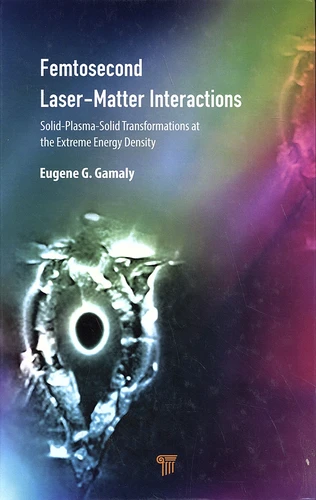Prix Nobel de la Physique
Femtosecond Laser - Matter Interactions. Solid - Plasma - Solid Phase Transformations at the Extreme Energy Density
Par :Formats :
- Paiement en ligne :
- Livraison à domicile ou en point Mondial Relay estimée à partir du 10 décembreCet article sera commandé chez un fournisseur et vous sera envoyé 10 jours après la date de votre commande.
- Retrait Click and Collect en magasin gratuit
- Livraison à domicile ou en point Mondial Relay estimée à partir du 10 décembre
- Nombre de pages270
- PrésentationRelié
- FormatGrand Format
- Poids0.585 kg
- Dimensions15,5 cm × 23,5 cm × 2,0 cm
- ISBN978-981-4877-40-4
- EAN9789814877404
- Date de parution24/02/2022
- ÉditeurJenny Stanford Publishing
Résumé
This book describes the ultra-short laser-matter interactions from the subtle atomic motion to the generation- of extreme pressures inside the bulk of a transparent crystal. It is the succ ssor to Femtosecond Laser-Matter Interactions : Theory, Experiment and Applications (2011). Explanation and -experimental verification of the exceptional technique for the phase transformations under high pressure are in the core of the book.The novel phase formation occurs along the unique solid- lasma-solid transformation path : the memory of the initial state is lost after conversion to plasma.
New phase forms from chaos during the cooling to the ambient. The pressure-affected material emains detained inside a pristine crystal at the laboratory tabletop. Unique super-dense aluminium and new phases of silicon were created by the confined micro-explosion. The text also describes th recent studies that used the quasi-non-diffracting Bessel beams. The applications comprise the new high-pressure material formation and micromachining.
The book is an appealing source for readers interested in the cutting-edge research exploring extreme conditions and creating nanostructures at the laboratory tabletop.
New phase forms from chaos during the cooling to the ambient. The pressure-affected material emains detained inside a pristine crystal at the laboratory tabletop. Unique super-dense aluminium and new phases of silicon were created by the confined micro-explosion. The text also describes th recent studies that used the quasi-non-diffracting Bessel beams. The applications comprise the new high-pressure material formation and micromachining.
The book is an appealing source for readers interested in the cutting-edge research exploring extreme conditions and creating nanostructures at the laboratory tabletop.
This book describes the ultra-short laser-matter interactions from the subtle atomic motion to the generation- of extreme pressures inside the bulk of a transparent crystal. It is the succ ssor to Femtosecond Laser-Matter Interactions : Theory, Experiment and Applications (2011). Explanation and -experimental verification of the exceptional technique for the phase transformations under high pressure are in the core of the book.The novel phase formation occurs along the unique solid- lasma-solid transformation path : the memory of the initial state is lost after conversion to plasma.
New phase forms from chaos during the cooling to the ambient. The pressure-affected material emains detained inside a pristine crystal at the laboratory tabletop. Unique super-dense aluminium and new phases of silicon were created by the confined micro-explosion. The text also describes th recent studies that used the quasi-non-diffracting Bessel beams. The applications comprise the new high-pressure material formation and micromachining.
The book is an appealing source for readers interested in the cutting-edge research exploring extreme conditions and creating nanostructures at the laboratory tabletop.
New phase forms from chaos during the cooling to the ambient. The pressure-affected material emains detained inside a pristine crystal at the laboratory tabletop. Unique super-dense aluminium and new phases of silicon were created by the confined micro-explosion. The text also describes th recent studies that used the quasi-non-diffracting Bessel beams. The applications comprise the new high-pressure material formation and micromachining.
The book is an appealing source for readers interested in the cutting-edge research exploring extreme conditions and creating nanostructures at the laboratory tabletop.


